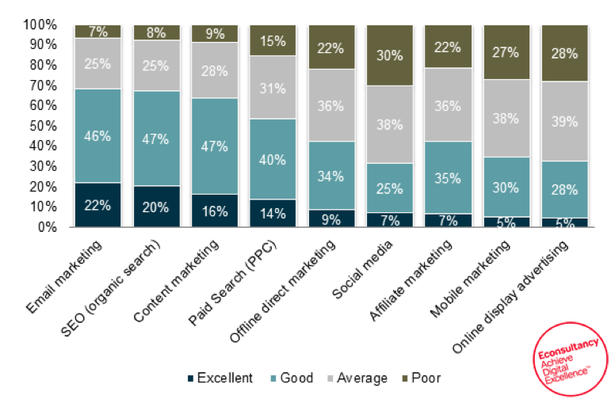Let’s talk about email marketing. Before you hit the “back” button in your browser, think about this for a second: of all the strategies businesses use to sell online (search, social, content, display, email), where do you think email marketing stacks up in terms of effectiveness? Towards the bottom? Middle of the pack?
If you’re like most, you probably think of email marketing as an out-of-date, overly spammed strategy close to extinction. Newer, sexier technologies like social media and mobile marketing are taking their place, enticing you to pour all your budget into these emerging technologies.
Yet despite its age and lack of shine, email marketing is still considered the strongest ROI channel by marketers. That’s right. Good ol’ email.
In a 2014 Econsultancy survey, marketers ranked email as the top ROI channel, just above SEO and far above less mature channels like social and mobile. 68% of respondents considered email marketing ROI “excellent” or “good” compared to just 32% for social and 35% for mobile.
So is email really going extinct? Not only does the data say it’s not going anywhere. The data suggests it's the most important tool in your digital marketing toolbox.
So why, after all these years, is email marketing still so effective?
1. It’s more targeted than most channels.
A healthy email database is made up of current, recent, and potential customers. This allows marketers to craft and customize their message for each type of user. No other digital technology lets you hit users at any stage of the buying funnel in this manner, making email marketing the most versatile channel you can invest in.
2. The technology is sophisticated, but the execution is not.
Today’s email marketing platforms have evolved significantly from their humble ancestors. Some platforms can even automate email blasts based on user activity and provide a wealth of data back on user response and engagement. Despite this sophistication, you don’t need to be a developer with coding experience to create or send an effective email blast. This makes the platform more accessible than other digital marketing channels.
3. It can be integrated with other marketing strategies.
Because email marketing allows you to control the timing and messaging, email marketing can support and enhance other marketing initiatives. For example, ecommerce websites can cross-sell products based on purchase behavior in real-time. Non-ecommerce websites, like those in the B2B space, can use email to promote trade shows or sponsored events leading up to an event date. Businesses are also using email to further distribute their original content.
4. It’s inexpensive.
You’d think the marketing channel with the highest ROI comes at a steep cost, but it’s actually one of the least expensive strategies you can implement. More sophisticated email platforms will naturally require a more significant investment, but that sophistication can also lead to a better ROI. Despite these economics, investments in email marketing typically account for less than 10% of digital marketing spend.
5. It’s great for reaching mobile users.
40% of emails are viewed on a mobile device, and like social media, users check email multiple times per day (in some cases, multiple times per hour). But unlike social media posts that get buried in a timeline, emails stick around until the user takes action. This increases the likelihood that the message gets seen, whether or not the user chooses to engage with the email
So while email marketing may not be the most exciting channel, it continues to perform at a high level and should be at the heart of every digital marketing strategy.
As chief operating officer of WebStrategies, Inc., Chris helps small businesses reach and connect with more customers online. He is the chief strategist for inbound marketing campaigns and the lead analyst for web analytics and website usability testing. Find Chris on Google+, LinkedIn, and Twitter.






Agree, disagree, or just have something to add?
Leave a comment below.